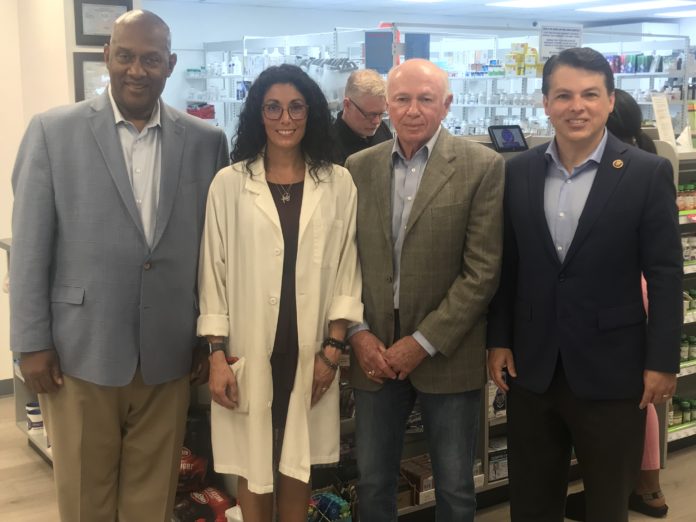U.S. Rep. Brendan Boyle last week joined Rep. Dwight Evans, his fellow House Ways and Means Committee member, for a news conference at Circle Pharmacy, 2981 Welsh Road, to praise the recently passed Inflation Reduction Act and how they say it will help people and families in Philadelphia and Pennsylvania.
Joining Boyle and Evans at the Aug. 17 event were Max Richtman, of the National Committee to Preserve Social Security and Medicare, and Chris and Gwen O’Neill, owners of Circle Pharmacy.
Boyle said the act – supported by all Senate and House Democrats, with no Republican votes – will allow Medicare to use its “enormous purchasing power” to negotiate prescription drug prices.
“These are lifesaving medicines,” Boyle said.
Starting in 2025, the out-of-pocket cost for Medicare prescription drugs will be $2,000 per year (roughly $165 per month).
“That will make such a difference,” Boyle said.
Richtman, who said Boyle and Evans have each scored 100 percent on his group’s scorecard, recalls being in the House gallery in 2003 when the Medicare prescription drug program passed (despite overwhelming opposition by Democrats). He blamed the pharmaceutical industry for opposing Medicare drug price negotiations at the time.
Now, Richtman is happy with the annual $2,000 out-of-pocket cap on drug costs.
“That’s going to make a huge difference for seniors across the country,” he said.
Boyle described the act, signed by President Joe Biden a day before the news conference, as one of the most significant bills he will probably ever vote on. In addition to the changes in Medicare prescription drugs, the act imposes a 15 percent minimum tax on corporations intended to reduce the deficit and increases climate change-related spending that supporters say will create 9 million jobs in the next decade
Evans specified that the Inflation Reduction Act extends premium subsidies in the Affordable Care Act’s marketplaces for three years, saving 13 million Americans $800 annually on health insurance premiums. He also pointed to a $35 cap on a month’s supply of insulin for 3.3 million diabetics on Medicare, with Richtman adding that the current cost can be $300 to $400.
Republicans opposed the bill, saying it will lead to too much spending, including for the IRS, and will not reduce inflation.
Asked if the Inflation Reduction Act will actually reduce America’s high inflation rate, Boyle merely pointed to even higher inflation rates in western Europe. ••






